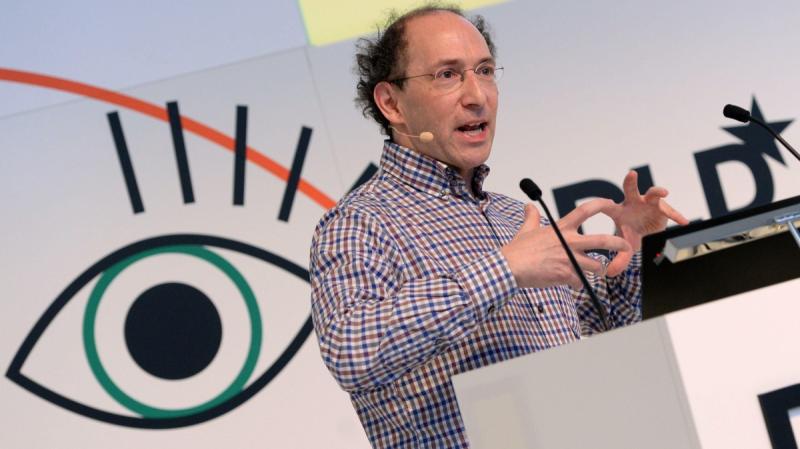
AI-generated summary
Conrad Wolfram, founder of the Computer-Based Math project and Strategic Director of Wolfram Research Europe, advocates for a fundamental overhaul of math education to suit the age of artificial intelligence. He argues that traditional math curricula, largely unchanged for a century, focus excessively on manual calculation—skills that computers now handle efficiently. Instead, Wolfram proposes prioritizing computational thinking, problem structuring, and the use of modern tools like AI to tackle complex, real-world problems. His approach emphasizes starting with meaningful, context-rich problems that engage students and teach them how to interpret results and formulate questions, fostering what he calls “computational literacy.” This shift demands a transformation in teaching methods, curriculum design, and assessment, moving away from rote procedures toward evaluating skills like problem-solving, tool usage, interpretation, and collaboration.
Wolfram also addresses common concerns about effort and cheating, clarifying that using computers is not an easy shortcut but enables deeper analysis and creativity. He contends that this model can be more cost-effective than traditional methods, especially if supported by integrated digital materials and well-designed curricula. Teachers’ roles evolve into facilitators who guide students’ curiosity and thinking rather than mere transmitters of knowledge. Ultimately, Wolfram calls on policymakers to fund complete educational packages focused on outcomes, trusting educators to lead this essential transformation. This new paradigm aims to prepare students not just for exams, but for a world where AI is ubiquitous and creativity is paramount.
The expert advocates for a radical change in math education: less manual calculation, more computational thinking, and real-world connection.
Conrad Wolfram is one of the leading voices in reinventing mathematics for the age of artificial intelligence. Founder of the Computer-Based Math project and Strategic Director of Wolfram Research in Europe, he has spent over a decade arguing that computers must stop being ignored in the classroom. His successful book The Math(s) Fix (2020) proposes a radical transformation of the curriculum, prioritizing computational thinking over manual calculation. Wolfram has collaborated with the Future Trends Forum of Fundación Innovación Bankinter and has shared his message on platforms like TED and the London School of Economics.
In this interview, Conrad Wolfram expands on the principles of his approach: from criticizing an education system stuck in the past to his vision of teaching connected to the real challenges of the 21st century, in a world saturated with data and shaped by artificial intelligence.
The underlying problem and the proposed change
Fundación Innovación Bankinter: Why is it still so difficult to change how mathematics is taught, even when everyone seems to agree that the current model doesn’t work?
Conrad Wolfram: Much of today’s education debate revolves around how to teach the same things we’ve always taught, but now with AI. And that’s not the right starting point. The math being taught today is still based on a world where computers didn’t exist. The education system has evolved, but its core hasn’t changed. And when it comes to changing it, many people say, “Yes, we need to reform math.” But what they really want is to make the old system work a bit better, not transform it.
I think many people don’t realize how much of the math content we teach is the same as it was 100 years ago. When they ask, “Why don’t kids learn math?” they usually mean why don’t they learn the same procedures they did. But the real question should be: are those procedures still relevant in a world with AI and computers? In my view, they’re not. So the first step is to completely rethink what it means to know math today.
Fundación Innovación Bankinter: So what would be the first step in rethinking it?
Conrad Wolfram: We must start by asking what people need to learn, not just how to teach it. And for that, we need a practical vision: how is math actually used? What I propose isn’t easier—on the contrary, it’s intellectually more demanding. But it’s more relevant. Many governments think that introducing computers makes things easier for students. In reality, it makes them harder, because they can tackle much more complex problems, but also ones more connected to the real world.
For years, reforms have failed because they’ve tried to happen without using computers. And of course, without computers, you can only solve very simple problems. But when you integrate technology, you can address real problems. And that’s what we need to teach: how to use modern tools to understand and solve the world around us.
Fundación Innovación Bankinter: Is that the new approach you propose?
Conrad Wolfram: What we advocate is starting with problems that have context, and ideally are interesting to the student. Allow people to use computers to help solve them. So when we teach math, we should begin with a problem people actually want to solve. Computers exist—that’s a fact—and they’re very good at calculating things. So we must ask: why do we keep teaching as if they didn’t exist?
We need to learn how to structure problems, interpret results, and formulate the right questions. That’s what I call computational literacy.
Computational thinking, AI, and the value of effort
Fundación Innovación Bankinter: How is computational literacy integrated, and what’s its relationship with artificial intelligence?
Conrad Wolfram: Computational literacy today is what classical literacy was in its time. In the 18th century, when reading and writing spread, not everyone agreed, but the societies that embraced it advanced greatly because they knew how to leverage the change. Today, the same is happening with computational thinking: no society is yet fully literate in this field, but the one that gets there first will have a huge advantage.
Why? Because in the world of AI, what matters isn’t applying manual procedures. Machines already do that. What we need are people who can think abstractly, structure problems, analyze data, generate ideas. Creativity, not repetition. And that requires a different way of teaching math.
Some countries that do very well in repetition and mechanization tests—like certain Asian nations—might not be as well prepared for this new scenario. Spain, on the other hand, has a great opportunity, because it has a more creative, flexible culture. If it invests well in this change, it could be among the leaders in computational literacy.
Fundación Innovación Bankinter: And how do we prevent students from losing their sense of effort or critical thinking when using computers and AI?
Conrad Wolfram: That’s a legitimate concern, but it stems from a misunderstanding. Using computers isn’t cheating, nor does it mean everything becomes easier. What matters is what we ask students to do with those tools. And here we must clearly distinguish between “process” and “goal.” The goal of math has never been to do long division by hand. It has always been—and still is—to apply those calculations to real needs. And for that, we now have more powerful tools than before. Being educated for life means knowing what machinery is available and how to use it to make better decisions. None of that is cheating.
When we use computers in the classroom, we can pose more complex, more real problems. And that demands more thinking, more analysis, more judgment—not less. But of course, it also requires a transformation of the teacher’s role, the curriculum, and the evaluation system. It’s a structural change.
Fundación Innovación Bankinter: How can such a different kind of learning be assessed if it’s no longer based on manual procedures?
Conrad Wolfram: Today, people still believe that only what can be checked with a traditional exam can be assessed, but that’s false. Current evaluation measures what’s easiest to measure, not what’s most important. If the only thing valued is students doing manual operations without mistakes, what’s being rewarded is not making errors. But real life doesn’t work that way.
In real life, you have tools, you have context, and you have to decide what to do, how, and why. We propose evaluating skills like structuring a problem, using tools like AI, interpreting solutions, working in teams… All of that can be measured. And it’s much more valuable than repeating algorithms without understanding anything.
For example, one of the problems we pose in our modules is this: a class is asked to flip a coin. Half the students are told to flip it for real, and the other half to cheat and just type “heads” or “tails” into the computer without flipping anything. Then they send the results to the teacher. Can the teacher tell who cheated? The answer is yes. By analyzing the data—the patterns, the uniformity of responses—it’s possible to detect who likely cheated. This is exactly the kind of problem that forces you to reason, apply modern knowledge, and prepares you for the real world. That’s the kind of evaluation we need.
Costs and challenges
Fundación Innovación Bankinter: Many countries argue they don’t have the resources to renew the curriculum or apply this model. Is it a cost issue?
Conrad Wolfram: That’s a common excuse, but it’s really a false dichotomy. The model we propose isn’t more expensive—it’s probably cheaper than the traditional system. What really costs money are textbooks, standardized exams, separate teacher training, uncoordinated materials. We propose building complete units, with content, tools, digital materials, and integrated exercises, supported by AI. That’s more efficient.
Of course, computers are needed, but today most students have access, even if only through a mobile phone. If they don’t, that’s a problem that needs solving, but it’s not as big as people think. The real difficulty isn’t cost—it’s having the political will to change. In a world where decisions, jobs, and challenges are mediated by AI and automation, continuing to teach as we did a hundred years ago is the most expensive thing we can do.
Fundación Innovación Bankinter: And how can this change be introduced in very traditional education systems?
Conrad Wolfram: First, by creating an alternative, coherent, and functional curriculum. Then, by finding teachers willing to try it. We don’t just say what should be taught—we provide real materials, guides, activities. The hard part is testing it, getting some students to follow that alternative path. For that, you need teachers willing to try, but also real, well-designed materials. We’ve already developed them, and we continue to do so.
Fundación Innovación Bankinter: So the teacher’s role changes radically?
Conrad Wolfram: Totally. I’ve said it before: the teacher should be the CEO of the classroom. Not someone who knows everything and transmits it, but someone who leads the process, motivates, facilitates, guides. For that, they don’t need to be experts in technical math. What they need is to understand the purpose and know how to guide their students toward it.
In that sense, confidence is key. An insecure teacher limits their students because they fear difficult questions. But those questions are exactly what we want. It’s not about knowing all the answers—it’s about fostering curiosity, thinking, connection with what’s happening outside the classroom. Personally, what I remember most from school isn’t the content, but the experiences. And many had nothing to do with the subject.
Training, outcomes, and a new educational mindset
Fundación Innovación Bankinter: What kind of training will teachers need in this new paradigm?
Conrad Wolfram: If you want teachers (and students) to adopt new technologies, don’t complicate their lives by starting with outdated or complex tools. That is, it’s not useful to use something ten times longer and harder to understand—it would be like putting someone in a 1930s car without synchronized gears when they’re just learning to drive. Let them drive a modern car first, and then, if they want, they can try a more complicated one. I think it’s the same with tools. We developed a tool called Wolfram Language, our language for communicating technical ideas: it’s high-level but very easy to use.
Fundación Innovación Bankinter: What human skills gain value in this age of artificial intelligence?
Conrad Wolfram: Machines can follow procedures, but they can’t replace creativity, imagination, the ability to connect unexpected ideas. Those are human qualities. In this new world, we don’t need people who can do manual operations that AI can solve in milliseconds—we need people who can pose the right problems, think in the right frameworks, and use computers as intelligent allies.
Fundación Innovación Bankinter: A final message for education policymakers?
Conrad Wolfram: When governments fund things, they should fund outcomes—complete deliverables. Not loose pieces that don’t lead to the desired result. We should say: this is the complete package, this is what you need to do. I think that would achieve much greater efficiency than other methods. And we need to trust teachers as responsible leaders of the classroom, not just transmitters. I believe this new approach is not just an option—it’s a responsibility we have if we want competent citizens in this new era.



